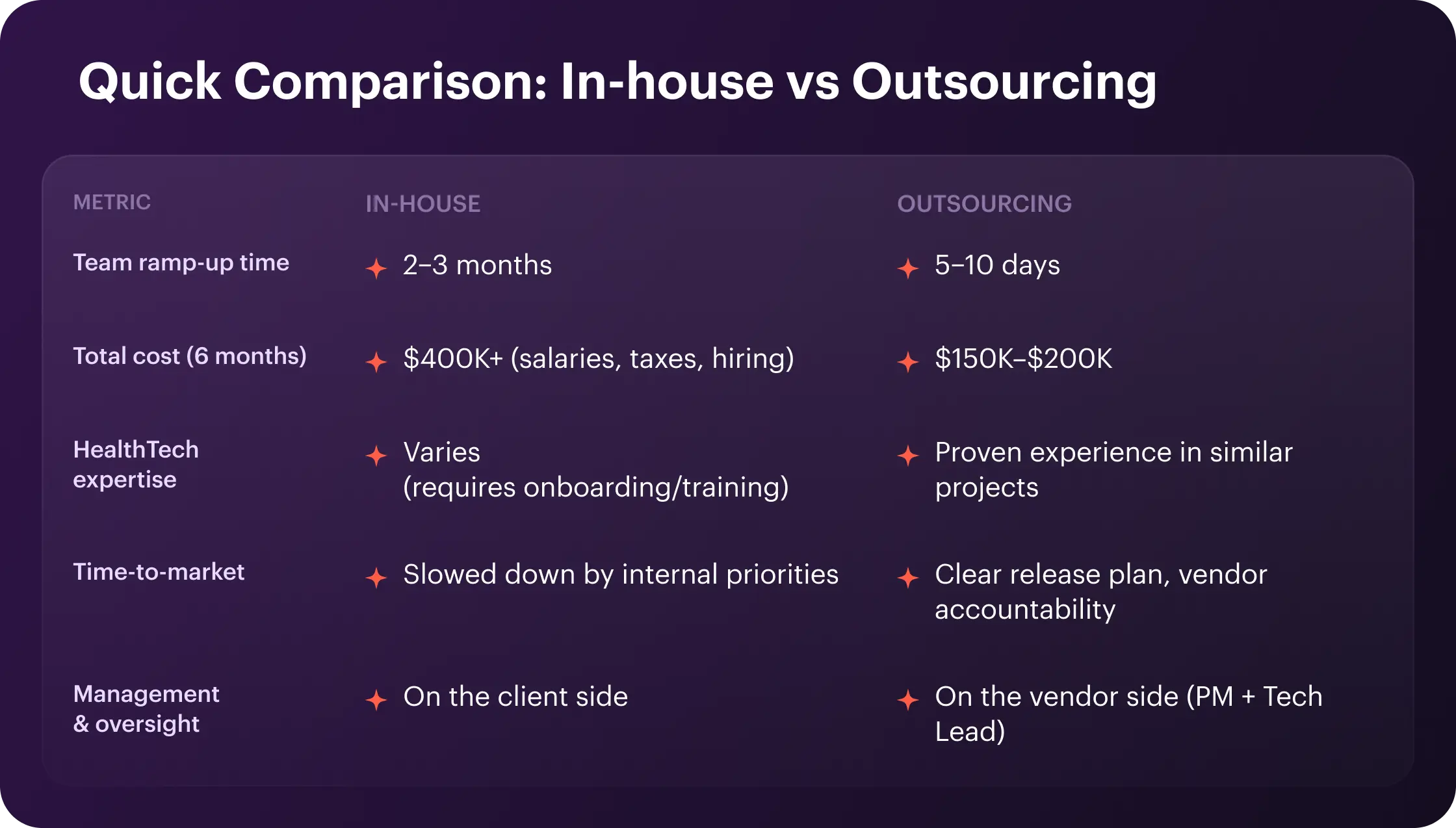Bespoke Application Development vs. Off-the-Shelf: A Quick Guide

Bespoke software is the future, and the numbers speak for themselves. In 2024, the market was valued at $44.52 billion and is expected to grow to $54.26 billion in 2025, with a staggering 21.9% CAGR. More businesses are choosing customized solutions to stay ahead.
This guide will walk you through everything—from the benefits to the challenges and emerging trends—will clarify what a bespoke application is, and help you make the best decision for your business on bespoke application development vs. off-the-shelf solutions.

What is Bespoke Application Development?
Bespoke or custom software development is the process of creating software from scratch, from concept to final implementation. It often comes with a higher cost and entails requirement gathering, planning, design, development, testing, deployment, and maintenance. It suits those who prioritize precision and uniqueness over speed and affordability.
However, the meaning of a bespoke application is not limited to creating a full, ground-up, purpose-built line of business application. It can also include:
- Custom integration with existing systems.
- Minor extensions or plug-ins for pre-built systems.
- Intuitive interfaces or forms connected to back-end databases.
- Data extraction reports from established systems.
- Extensive personalization of enterprise solutions.
Darly Solutions takes it all—cross-platform development, custom healthcare hardware integrations, device-agnostic UI/UX frameworks, and secure data transmission. Moreover, we offer PWAs for healthcare services, native and hybrid mobile apps for patient and provider engagement, and seamless integration with cloud-based health records and data analytics platforms.
What is Off-the-Shelf Application Development?
Off-the-shelf application development refers to pre-built software solutions that are readily available for purchase and use. These applications are designed for mass use, are commercially available, and can be implemented quickly without significant customization.
While they offer comprehensive features to streamline operations across industries, they might not fully address specialized business requirements. Especially if it is an open-source solution that requires integration or customization. In this case, the help of an external team expert is a must.
Bespoke Application Development vs Off-the-Shelf Solutions: What to Choose
The choice between bespoke software and off-the-shelf tools hinges on whether your business needs a scalpel or a Swiss Army knife. While prebuilt solutions promise convenience, custom-built software offers precision. Here’s how to navigate the trade-offs.
Prebuilt tools thrive in environments where standardization works. Small businesses that need a basic CRM to track leads might find Salesforce or HubSpot perfectly adequate. These platforms offer turnkey functionality, rapid deployment, and predictable subscription costs—ideal for generic tasks like HR ticketing, document management, or simple e-commerce.
The catch? One-size-fits-all tools often force compromises. A SaaS sales platform might lack multilingual support for global teams or impose rigid workflows that clash with your sales cycle. Over time, subscription fees for unused features can add up, and scaling might hit walls, like hitting user limits or lacking API access for critical integrations.
Even flexible off-the-shelf tools come with invisible trade-offs. A retail chain using a popular POS system might struggle to customize loyalty programs to meet regional customer preferences. A logistics company could waste hours daily navigating cluttered interfaces filled with irrelevant freight-management tools. Worse, gaps in compliance (e.g., GDPR or industry-specific regulations) might emerge, requiring costly workarounds.
Bespoke software sidesteps these pitfalls by design. For instance, a custom-built CRM for a luxury real estate agency could integrate AI-driven lead scoring tailored to high-net-worth client behavior—something no generic CRM offers.
Off-the-shelf tools are like renting a suit: convenient, affordable, and fine for occasional use. Bespoke software is a tailored wardrobe: designed to fit perfectly, adapt as you grow, and reflect your identity. Choose rental for temporary needs; invest in tailoring when the stakes—and your vision—are permanent.

Key Features of Bespoke Applications
Bespoke software should feature solutions that fulfill current requirements and future ambitions, emphasizing adaptability, security, and performance. And features don’t end here; read on for more:
- Scalability. Bespoke software adjusts to business growth, adding capacity without a complete redesign.
- Custom UI/UX. Tailored UI/UX enhances user interaction, improving efficiency and adoption.
- System Integration. Bespoke software integrates with existing systems (CRM, ERP), streamlining workflows.
- Robust Security. Custom software offers encrypted storage, access controls, and regulation compliance (e.g., GDPR, HIPAA).
- Advanced Analytics. Custom analytics tools deliver insights that inform smarter business decisions.
- Automation. Bespoke software automates repetitive tasks, improving efficiency and reducing errors.
Benefits of Bespoke App Development
Mass-market software can't keep up with unique business needs, and it shouldn't since the world has bespoke app development. It delivers purpose-built solutions with superior performance, scalability, and customization. Thus, businesses can benefit from operational improvements to strategic gains. And the benefits don't end here. Let's review all of them in detail.
Tailored to Your Business Needs
Bespoke apps development delivers a solution that fits your business like a glove. Generic software often has a one-size-fits-all design, which means companies have to either adjust their workflows or give up on features that don't suit their needs.
In contrast, a bespoke app is built to meet your exact needs, from unique customer interactions to niche operations and industry-specific challenges.
For example, retail businesses might benefit from apps that sync inventory with personalized rewards, and healthcare providers might need secure platforms that meet strict regulations. Custom solutions strip away the excess, ensuring every feature adds real value.
Improved Efficiency and Productivity
Put simply, generic software slows you down—bespoke apps speed you up. Built for your business, they reduce waste, automate jobs, and smooth workflows.
Picture this: A logistics company cuts delivery times with real-time route optimization. A manufacturer uses a streamlined dashboard to monitor production with ease. No more wasted clicks or guesswork, fewer mistakes, and a team ready to drive the business forward.
Competitive Advantage
In a crowded market, standing out is everything. A bespoke app gives you an edge by delivering unique features, seamless branding, and faster decision-making tools—advantages competitors can't match.
For instance, a bespoke e-commerce app might include exclusive features like AI-driven product recommendations tailored to your audience, setting you apart from rivals that still use standard platforms.
Exclusivity sets you apart, earns loyalty, and solidifies your reputation as an industry trailblazer.
Better Integration with Existing Systems
Off-the-shelf software rarely plays well with others, forcing clunky workarounds. A custom solution is designed to sync seamlessly with your CRM, databases, and accounting tools—eliminating data silos and tech headaches for good.
For example, a custom financial app can plug directly into legacy systems for instant reports, while a retail app keeps point-of-sale and online inventory in perfect sync. No delays, no errors—just smooth, real-time operations.
Challenges in Bespoke App Development
Yet, while bespoke app development offers many benefits, it often comes with a set of challenges. Here are some common:
Significant Upfront Investment
Unlike off-the-shelf software with fixed pricing, custom apps demand investment in design, development, and deployment. Skilled teams and specialized tools drive up costs, but the long-term value makes it worthwhile.
Extended Development Timeline
A custom app is rarely built overnight. The process demands time, sometimes over a year, from defining features to coding and testing. Unexpected challenges like unforeseen technical issues, scope changes, or resource constraints can pop up. However, proper planning and teamwork will result in a super-fit solution.
Challenges With System Integration
Bespoke apps promise seamless compatibility, but legacy systems and outdated software can throw a wrench in the process. Without careful planning, expect workflow breakdowns, data silos, and functionality gaps. A smart strategy keeps your tech running like clockwork.
Continuous Maintenance and Support
Once the app is deployed, the work doesn’t stop. A bespoke app needs regular fixes, upgrades, and compatibility checks. Even the best custom software falls behind without a dedicated support team or budgeting for regular developer input.
Bespoke Software Development Workflow
The workflow of bespoke software development may vary from project to project. Yet, the basic step-by-step guide involves key phases we follow to ensure your project is delivered successfully:
Initial Consultation and Requirement Gathering
This phase kicks off the process. We meet with you to discuss your business goals, challenges, and specific needs. We gather the requirements that will shape your software through detailed conversations and analysis to ensure the software meets your requirements.
Project Planning and Design
With precise requirements, the project moves into planning. Our developers and designers create wireframes, prototypes, and system architectures to visualize the app's structure. A roadmap outlines milestones, timelines, and deliverables for efficient execution.
Development Phase
Here's where the coding happens. Our developers turn the design into functional software, writing high-quality code based on the agreed specifications. Using agile development methodologies, we refine the product through iterative improvements and ongoing feedback.
Testing and Quality Assurance
Quality is non-negotiable. In this phase, we rigorously test the software to catch and fix bugs, verify it meets your requirements, and ensure it performs well under various conditions. Functional, usability, and stress tests verify a seamless user experience across different devices and environments.
Deployment and Implementation
After passing all quality checks, the software moves to production. The implementation process includes data migration, system integration, and user onboarding to ensure a smooth transition with minimal disruptions.
Post-Launch Support and Maintenance
Bespoke software requires ongoing updates, security patches, and performance optimizations. This ensures your software stays effective, secure, and aligned with your business over time.
Real-Life Examples of Successful Bespoke Applications
Now that we've covered the basics, let's see bespoke software in real-world cases.
Shopify
Bespoke software isn't just for niche businesses. Shopify, Amazon, and eBay all started with custom platforms to stand out. Shopify offers powerful templates, but its customization is what sets it apart. Businesses can personalize their stores with custom themes, apps, and tools for inventory and marketing. Shopify's Liquid engine lets companies add custom website features, delivering a totally unique experience.
Mayo Clinic's Custom Oncology Treatment Software
Partnering with SimBioSys, they are building next-gen oncology software that uses AI, biophysical modeling, and patient imaging to customize cancer care. The software aims to reshape precision medicine by improving surgical strategies, refining drug selection, and sharpening risk assessments for breast cancer.
Tesla's Vehicle Operating System (OS)
Tesla builds bespoke software for its electric vehicles, including the vehicle operating system (OS) that manages navigation, entertainment, autopilot features, and over-the-air updates. This custom software ensures flawless integration with Tesla's hardware for an optimal user experience.
Key Factors for Picking the Right Bespoke Software Developer
Selecting the right developer is pivotal. Here are key factors to consider:
Expertise and Experience
The right developer blends experience with technical know-how. Review their portfolio for similar projects, confirm their proficiency in your tech stack, and ensure they understand your industry’s requirements. Look for certifications that prove their expertise in cloud platforms like AWS and Microsoft Azure.
Communication and Collaboration
A great developer listens, translates, and updates. They ask thoughtful questions to clarify your vision, keep you informed with consistent updates, and simplify complex ideas. Fast responses show respect for your time and keep the project moving smoothly.
Proven Track Record and Reputation
A developer’s reputation is a window into their capability. Check reviews on Clutch or LinkedIn to gauge client satisfaction, ask for case studies detailing their challenges and solutions, and request references to hear directly from past clients.
Project Management and Timeliness
For on-time software delivery, look for a developer who excels in project management. A clear timeline with milestones, practical tools like Monday.com, and Agile methodologies are a must.
Cost Transparency and Budget Alignment
Don’t just chase the cheapest option—focus on the value a developer brings. Request a breakdown of costs and ensure there are no hidden fees. Compare their rates with industry standards, but remember, a slightly higher price for skilled expertise can save you from costly fixes later.
Ongoing Support and Maintenance
Bespoke software isn’t complete once it’s launched. Your developer should offer comprehensive post-launch support, including quick response times, bug fixes, and updates. Ensure they’ll be available for emergencies and future enhancements. Well-organized documentation empowers your team to troubleshoot and manage the system.
Adaptability and Flexibility
Software projects shift. Choose a developer who listens, solves problems, and adapts quickly—one who can adjust timelines, budgets, and features without missing a beat.

Upcoming Trends in Bespoke Application Development
New tech and business shifts are pushing bespoke app development into the future. Here’s what’s driving the next wave.
Low-Code and No-Code Platforms
Low-code and no-code platforms are set to dominate bespoke software, making custom applications faster, cheaper, and more accessible than ever. Businesses can now build and adapt solutions instantly, eliminating traditional development roadblocks.
Artificial Intelligence (AI) and Machine Learning (ML) Integration
Custom software now learns, predicts, and automates with AI and ML. These technologies automate repetitive tasks, provide predictive analytics, and power features like chatbots and recommendation systems. AI and ML transform apps into intelligent systems that streamline operations and elevate user experiences.
Cloud Computing and Serverless Architectures
Cloud-based solutions and serverless architectures reshape custom app development with instant scalability, cost savings, and flexibility. These technologies let businesses adjust apps to fluctuating workloads without managing complex infrastructure.
Enhanced Security and Data Privacy
As cyber threats and data regulations intensify, bespoke development is shifting towards stronger security. Encryption, multi-factor authentication, and compliance are leading the way in ensuring data privacy in custom applications.
Agile Methodologies and DevOps Practices
Agile and DevOps are the new standards for bespoke applications. These methods drive faster rollouts, higher-quality software, and continuous adaptability to keep pace with ever-changing business demands.

Darly Solutions Bespoke Software Development Services
Darly Solutions delivers bespoke software that meets your specific needs. Our team excels in creating efficient back-end systems, dynamic front-end interfaces, and web solutions that drive success and growth. Let’s look at some essential steps in our bespoke software development:
Backend Development. A great web application needs both style and substance. Our back-end developers bring years of experience to create everything from simple payment gateways to complex user portals.
Front-end Development. Our front-end developers craft visually stunning, functional interfaces, using designs and prototypes to deliver exceptional quality quickly.
Web Development. With full-stack expertise, we use the latest technologies to create digital products that deliver on your unique business goals.
Web Design. Our UX/UI designers create clean, powerful designs that improve user engagement and conversions. Mockups and prototypes offer a sneak peek of your final product.
If you’d like to explore Darly Solutions’ cases, please visit our portfolio.
Wrapping up
Generic software simply doesn’t cut it when it comes to business success. Darly Solutions offers custom-built software that perfectly aligns with your unique business requirements, ensuring scalable, efficient solutions that grow with you. Our bespoke offerings help you gain a competitive edge over those relying on off-the-shelf solutions. With Darly Solutions, you invest in a software solution that adapts to your business, delivering long-term value and flexibility to stay ahead. Reach out today to discuss your project, and let’s build something exceptional together.
FAQ
Upfront, yes—it’s an investment. But in the long run, bespoke apps can save you money. They automate tasks and make workflows smoother. So, you won't need several subscriptions to piece a solution together. Over time, the efficiency gains and reduced headaches make it worth every penny.
Bespoke apps put security first. Since it’s custom-built, you can implement the latest, most robust security measures tailored to your specific risks and compliance needs, unlike off-the-shelf software, which can be a target for hackers due to its widespread use.
Absolutely! One of the biggest perks of bespoke development is that your app can connect seamlessly with the tools you already use. Whether it’s your CRM, accounting software, or inventory system, a custom app can tie everything into one seamless operation. No more data silos or clunky workarounds—just smooth, efficient processes.
You bet. Most reputable developers offer maintenance and support packages to keep your app running smoothly. Whether they fix bugs, roll out updates, or add new features, they’ve got your back.
Connect with us
.webp)
We are a tech partner that delivers ingenious digital solutions, engineering and vertical services for industry leaders powered by vetted talents.










.webp)


